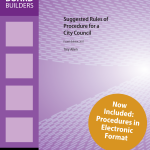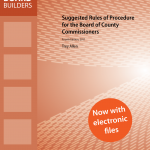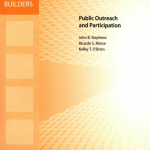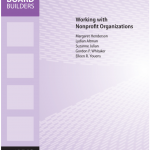Topic: Board Builders

Suggested Rules of Procedure for a City Council, Fourth Edition, 2017
Now in its fourth edition, this book provides city councils with model procedural rules for their meetings. The model rules cover, among many other topics, the organizational meeting, pertinent requirements of the open meetings law, the role of the presiding officer, agenda preparation and approval, substantive and procedural motions, voting rules, ordinance adoption, public hearings, and public comment periods. Legal and practical issues are analyzed in the comments that follow each rule.
The fourth edition differs from prior editions in important ways. It incorporates significant statutory changes that have occurred since a revised version of the third edition was published in 2007. Both the rules themselves and the comments have undergone extensive modifications in an effort to make the book even more useful to municipal governing boards. New appendixes include tables showing the numbers of members necessary to establish a quorum and the number of votes required to adopt an ordinance or approve a contract.
This book is a must for council members, city managers and administrators, city clerks, and city attorneys. Anyone with a general interest in local government or parliamentary procedure will also want a copy.
BONUS FEATURE: The book contains information to help readers download a digital version of the book’s procedural rules that can be customized to fit a council’s specific needs.
…
Continued
Suggested Rules of Procedure for the Board of County Commissioners
Now in its fourth edition, this book provides boards of county commissioners with model procedural rules for their meetings. The model rules cover, among many other topics, the organizational meeting, pertinent requirements of the open meetings law, the role of the presiding officer, agenda preparation and approval, substantive and procedural motions, voting rules, ordinance adoption, public hearings, and public comment periods. Legal and practical issues are analyzed in the comments that follow each rule.
The fourth edition differs from prior editions in important ways. It incorporates significant statutory changes that have occurred since a revised version of the third edition was published in 2002. Both the rules themselves and the comments have undergone extensive modifications in an effort to make the book even more useful to county boards.
This book is a must for county commissioners, county managers, county clerks, and county attorneys. Anyone with a general interest in local government or parliamentary procedure will also want a copy.
BONUS FEATURE: The book contains information to help readers download a digital version of the book’s procedural rules that can be customized to fit a council’s specific needs.
…
Continued
Public Outreach and Participation
Although city and county elected officials frequently hear from their constituents, officials and citizens often do not fully understand how public participation occurs and how it informs decision making by municipal and county boards.
This book, part of the Local Government Board Builders series, offers ideas for engaging the public, assesses the strengths and weaknesses of a variety of participation mechanisms, and provides guidance for better public outreach. It also discusses ways of developing long-term community participation.
See the Local Government Board Builders Series webpage for other books in the series and related School of Government publications.
Cite as:
Stephens, J., Morse, R. and O’Brien, K. (2011). Public Outreach and Participation. [Chapel Hill, N.C.]: UNC School of Government.
…
Continued
Working with Nonprofit Organizations
Facing the challenges of providing more and better services while being constrained by difficult fiscal limits, local governments across the United States have increased their involvement with nonprofit organizations, involving nonprofits in service delivery and drawing on these organizations’ volunteers and private financial resources. Some nonprofits have also become skilled advocates for their local government clients, making persuasive appeals for public funding of their work or otherwise helping shape government priorities.
This guidebook focuses primarily on the basic questions North Carolina local governments should ask themselves when deciding whether and how to fund nonprofits. If a governing board is considering an ongoing partnership with a nonprofit, many of these same considerations will apply.
Part of the Local Government Board Builders series, this book was written for elected officials of municipal and county governments, but governing officials of other kinds of public entities, such as councils of government, might also find the information useful.
Cite as:
Henderson, M., Altman, L., Julian, S., Whitaker, G. and Youens, E. (2010). Working with nonprofit organizations. [Chapel Hill, N.C.]: UNC School of Government.
…
Continued- 1
- 2

